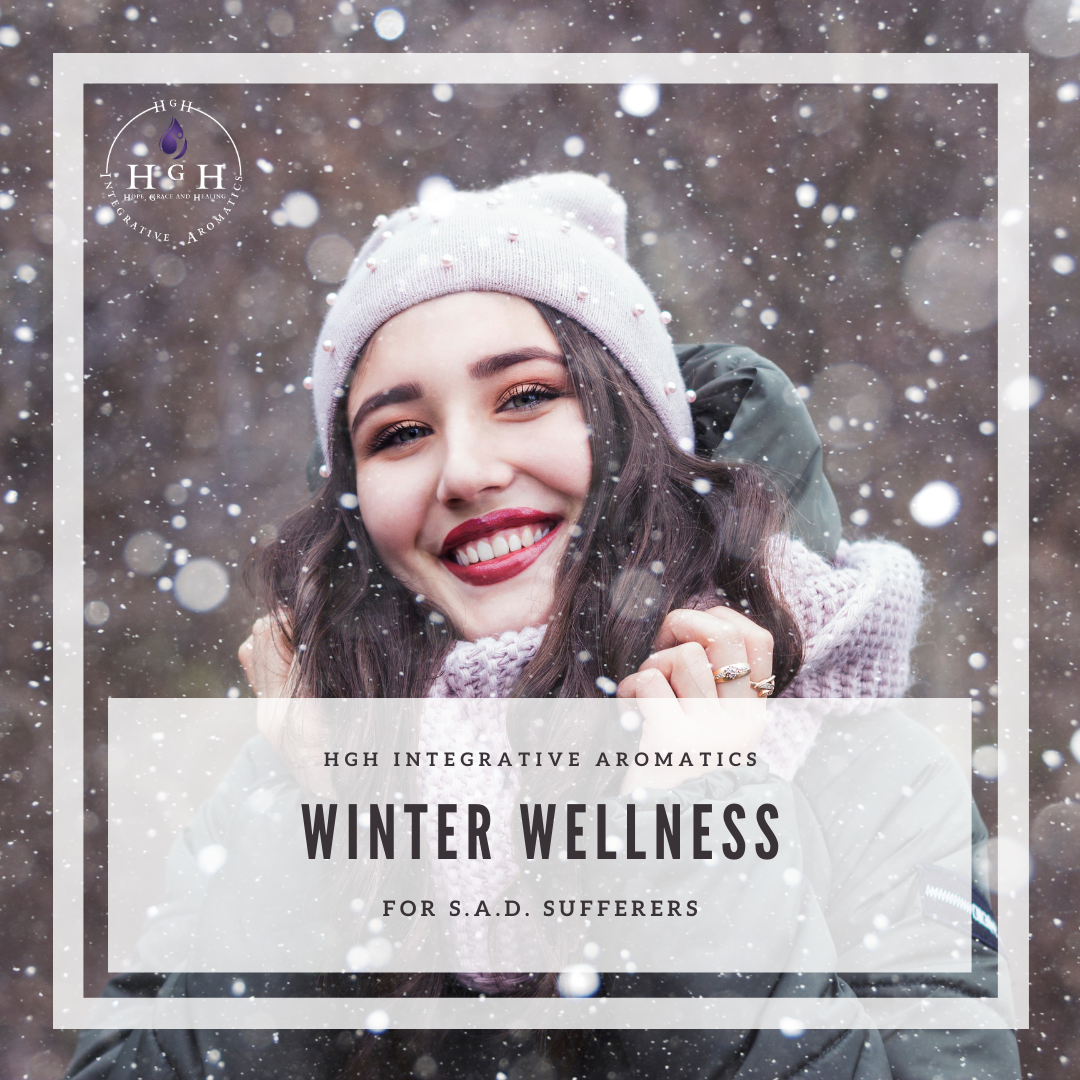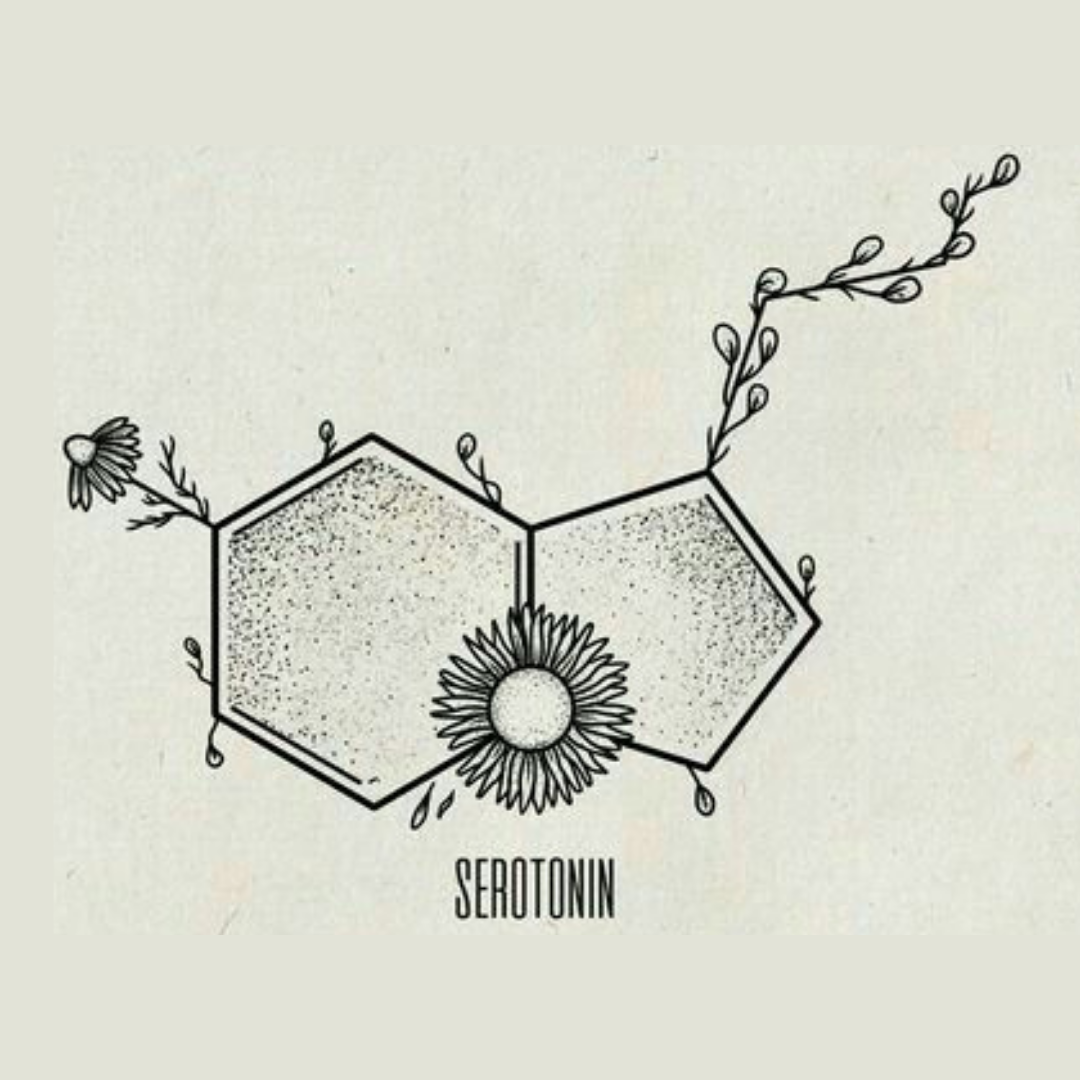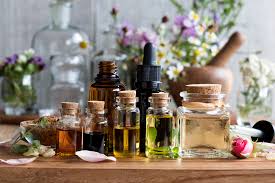Winter Wellness for SAD Sufferers
Posted by T. Schuur | Integrative Health Practitioner | Aromatherapist | Herbalist | Botanical Chemistry & Formulation on 26th Jan 2021
Winter Wellness for S.A.D. Sufferers

What Causes Seasonal Affective Disorder?
Researchers are unclear on what exactly causes seasonal affective disorder, but studies suggest a few possible sources:
- Serotonin deficiency. Serotonin is one of the feel-good hormones, like endorphins and dopamine. If your serotonin levels are low, you need more vitamin D — the vitamin responsible for producing this hormone. A vitamin D deficiency is common in the winter when people spend less time in the sun.
- Irregular melatonin levels. Shorter, darker days also affect your body’s melatonin levels. Melatonin is a hormone that controls your wakefulness. When it’s dark, your body produces more melatonin, causing you to feel tired. That’s why you may feel sleepy more often in the winter.
- Upset circadian rhythm. Also referred to as your biological clock, your circadian rhythm can be disrupted as the daylight hours grow shorter and shorter. Your body may have a hard time adjusting to a normal sleep schedule because of this disruption.
The good news is you have several options for treating the sadness and fatigue that comes along with seasonal affective disorder. Some effective strategies for treating SAD may include taking a vitamin D or melatonin supplement. You might also benefit from spending more time outside and doing light therapy.
Another promising treatment that has gained a lot of popularity in recent years is the use of aromatherapy

A Little on Aromatic Science
The benefits of these amazing oils range from helping you sleep better, balancing and calming the senses, to giving you a much-needed pick-me-up. They can also be used medically to support the management of symptoms associated with tachycardia, menopause, musculoskeletal issues, hormone balancing and in cases of anxiety and depression.
Our sense of smell is linked to the deepest parts of the brain, the limbic region, and is governed by your basic instincts, thoughts and emotions.
How Do Essential Oils Work?
Essential oils work in one of two ways. You can apply them to your skin where they become absorbed into your bloodstream. Or you can diffuse them and inhale the essential oils so that they stimulate your central nervous system. When used properly, essential oils offer many benefits to your well-being.

Which Essential Oils May Treat SAD?
A number of essential oils are used in aromatherapy to treat depression, anxiety, and fatigue — all of which are common symptoms of seasonal affective disorder. Below are a few of the most common oils used for this purpose.
Bergamot (Citrus bergamia)
Bergamot oil comes from the lime-green bergamot orange. It is one of the most popular essential oils for treating depression. This oil has been studied at length and has been confirmed as a good choice for the effects of SAD.
Orange (Citrus sinensis) and Lemon (Citrus limon)
Other citrus fruits that are useful for aromatherapy include lemons and oranges. Oils from these fruits can help you feel more calm and alert. Try massaging a blend of orange and lemon oils onto your temples (diluted) for nearly instant relaxation. Studies are clear that these citrus oils are good choices for relief of stress, anxiety and depression. Lemon in fact lowers blood pressure, facilitates electrocardiogram changes and decreases anxiety.
Basil (Ocimum basilicum)
In addition to giving soups, stews, and other dishes a tasty flavour, basil may also provide a mental boost. Research suggests that basil can help prevent burnout and mental fatigue. You can mix it with peppermint or rosemary for an extra concentration boost.
Clary Sage (Salvia sclarea)
If you have trouble sleeping or feel anxious throughout the day, clary sage may offer relief. This flowering herb helps to induce sleep and bring a sense of calm when sniffed. In addition, Clary sage is a well documented evidenced oil used in standard depression as well as in postpartum depression.
Rose (Rosa damascena)
Rose oil is pressed out of the petals of roses. Several studies demonstrate its effectiveness at relieving stress and symptoms of depression. Consider combining it with lavender oil for even greater relief.
Lavender (Lavendula angustifolia)
Lavender Essential Oil has a refreshingly aroma that can be both herbaceous and sweet at the same time with occasionally fruity notes interspersed. It has much evidence and has been well documented for sedative properties as well as for its ability to help calm stress and anxiety and to help promote sleep. It has become a popular, trendy even scent, in many everyday items ranging from shampoo to candles. The large majority of these items are made with synthetic fragrance and lack the complex health benefits that true lavender essential oil is known for.
Cedarwood (Cedrus atlantic)
The rich woody aroma of Cedarwood is one of the first known extracted essential oils. It was likely in a crude fashion as opposed to that of todays scientific extraction methods, but it was one of the oils that the Egyptians used for spiritual embalming purposes. Today we have many documented studies on Cedarwood and its grounding and calming effect. It is a strong natural ally to combat negative emotions, stress, anxiety and depression.
Petitgrain (Citrus aurantium)
Because it is distilled from the leaves and sometimes also the twigs, Petitgrain is less floral and less citrusy in fragrance than Neroli or Orange. Petitgrain's scent is one that is sweet, yet tart with subtle floral and woody characteristics. It blends especially well with citrus, floral and wood oils. Studies conclude that Petitgrain is an uplifting, calming and balancing essential oil. It has much research to confirm its use for easing anxiety and high stress situations.
Yuzu (Citrus junos)
Yuzu is a citrus fruit native to East Asia and a hybrid of sour mandarin and other citrus fruits. The aroma of this essential oil is tangy, with a sweet-warmth typical of citrus. Diffused or when mixed with other oils it aroma is purifying, inspiring and some feel, personally empowering. It has significant research to indicate it as an excellent choice for persons struggling with anxiety, depression and stress overload.
Sandalwood (Santalum album)
Sandalwood smells rich, deep and sweet, yet is delicate, woody and floral. Sandalwood Essential Oil is deeply grounding and is useful for chakra work.Emotionally, Sandalwood Essential Oil is calming and helps to instil a sense of inner peace. According to studies, it is a good choice in persons suffering from stress, anxiety and depression. Sandalwood oil is extracted mostly by steam distillation, in this process super heated steam is passed through the powdered wood. The steam then caries the oil locked inside the cellular structure of the wood. After the steam has been cooled you get sandalwood hydrosol and sandalwood essential oil.
For more information about which essential oils may help you manage your SAD symptoms this winter reach out to HgH Integrative Aromatics Certified Aromatherapist and Herbalist, or talk to a trusted and qualified natural health practitioner.

How Do You Use Essential Oils?
For topical use of essential oils, it is absolutely critical for you to properly dilute them with a carrier oil, such as olive oil, sweet almond oil, or grape seed oil. A 1–5% ratio of essential oil to carrier oil dependant on the purpose and treatment, the person using the oil and the area and way in which the essential oil is to be used. Dilution is very important as essential oils are too concentrated to use on their own are known to cause adverse reactions when used incorrectly and not properly diluted.
Once you’ve diluted your oil, you can massage a few drops on your temples, feet, wrists, neck, or the skin behind your ears. If you prefer, add five or six drops to a 300ml ultrasonic diffuser.
If you choose to use a diffuser, leave it on for 30 to 60 minutes at a time for up to 3 times a day. After a few sessions, you should start to feel a noticeable improvement in your mood.
According to essential oil safety expert Robert Tisserand, “Intermittent diffusion is much more effective, as well as being safer, than continuous diffusion. Intermittent means 30-60 minutes on, then 30-60 minutes off.
This is because our body, especially our nervous system, habituates after this length of time. With continuous diffusion, while benefits do not increase, there is evidence that the body becomes stressed in various ways.
However, very low levels of diffusion – so the essential oil is barely noticeable – are fine anywhere, for any length of time.”
At HgH Integrative Aromatics, we supply a range of essential oils, customizable essential oil blends and essential oils jewelry and patches. Additionally, we have a certified aromatherapist on staff, providing expert services to clients to help them select appropriate, safe and effective essential oils to meet their specific wellness needs and physiology.
Contact us today to learn more about our high-quality aromatherapy services and products and how they can help you enjoy a boosted mood and enhance your winter wellness.
